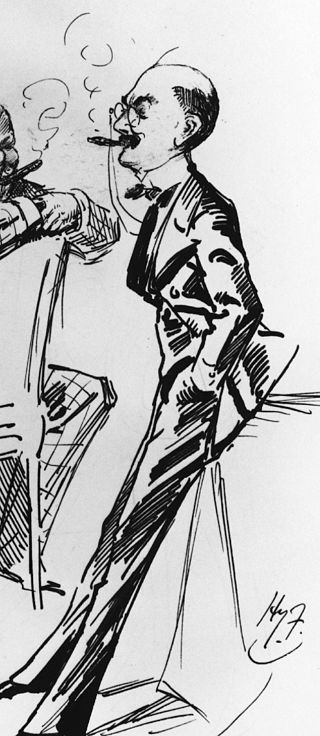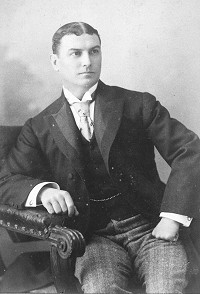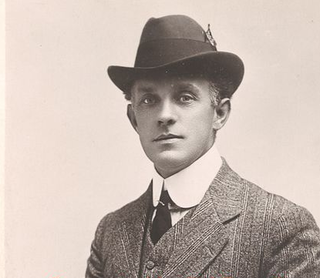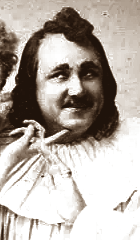
Vice Versa: A Lesson to Fathers is a comic novel by Thomas Anstey Guthrie, writing under the pseudonym "F. Anstey", first published in 1882. The title originates from the Latin phrase "vice versa", meaning "the other way around".

Roger Livesey was a British stage and film actor. He is most often remembered for the three Powell & Pressburger films in which he starred: The Life and Death of Colonel Blimp, I Know Where I'm Going! and A Matter of Life and Death. Tall and broad with a mop of chestnut hair, Livesey used his highly distinctive husky voice, gentle manner and athletic physique to create many notable roles in his theatre and film work.

Thomas Anstey Guthrie was an English author, most noted for his comic novel Vice Versa about a boarding-school boy and his father exchanging identities. His reputation was confirmed by The Tinted Venus and many humorous parodies in Punch magazine.

Sir Francis Cowley Burnand, usually known as F. C. Burnand, was an English comic writer and prolific playwright, best known today as the librettist of Arthur Sullivan's opera Cox and Box.

Dulcie Winifred Catherine Savage Denison,, known professionally as Dulcie Gray, was a British actress, mystery writer and lepidopterist.

The Gaiety Theatre was a West End theatre in London, located on Aldwych at the eastern end of the Strand. The theatre was first established as the Strand Musick Hall in 1864 on the former site of the Lyceum Theatre. In 1868, it became known as the Gaiety Theatre and was, at first, known for music hall and then for musical burlesque, pantomime and operetta performances. From 1868 to the 1890s, it had a major influence on the development of modern musical comedy.

Frank Albert Daniels was a comedian, an actor on stage, early black-and-white silent films, and a singer.

George Grossmith Jr. was an English actor, theatre producer and manager, director, playwright and songwriter, best remembered for his work in and with Edwardian musical comedies. Grossmith was also an important innovator in bringing "cabaret" and "revues" to the London stage. Born in London, he took his first role on the musical stage at the age of 18 in Haste to the Wedding (1892), a West End collaboration between his famous songwriter and actor father and W. S. Gilbert.

John Le Hay was the stage name of John Mackway Healy, an English singer and actor known for his portrayal of the comic baritone roles in the Savoy Operas. He also appeared in non-musical plays, adaptations of French comic operas and opérettes, and in Edwardian musical comedy, usually in comic roles, though sometimes in more serious character parts. As a skilled ventriloquist he appeared before royalty, and periodically he presented his own one-man entertainment during his half-century long stage career.

Vice Versa is a 1948 British comedy film written and directed by Peter Ustinov and starring Roger Livesey, Anthony Newley, Petula Clark, and Kay Walsh. It is the third screen adaptation of the 1882 novel Vice Versa by F. Anstey. The film was produced by Two Cities Films and distributed by General Film Distributors.

John Hollingshead was an English theatrical impresario, journalist and writer during the latter half of the 19th century. After a journalism career, Hollingshead managed the Alhambra Theatre and was later the first manager of the Gaiety Theatre, London. Hollingshead also wrote several books during his life.

Furneaux Cook, born John Furneaux Cook, was an English opera singer and actor best known for baritone roles in the comic operas of Gilbert and Sullivan and Alfred Cellier on the London stage. Cook appeared on stage for over 30 years in London, the British provinces and America.

Edward Rose was an English playwright, best known for his adaptations of novels for the stage, mainly The Prisoner of Zenda. He was also the theatre critic for The Sunday Times.

An Old Score is an 1869 three-act comedy-drama written by English dramatist W. S. Gilbert based partly on his 1867 short story, Diamonds, and partly on episodes in the lives of William Dargan, an Irish engineer and railway contractor, and John Sadleir, a banker who committed suicide. It was written before any of his Savoy Operas with Arthur Sullivan. Despite an encouraging review in The Times, the piece was a failure. It was revived in 1872 and rewritten as Quits, but it fared no better.

Henry Bracy was a Welsh opera tenor, stage director and opera producer who is best remembered as the creator of the role of Prince Hilarion in the Gilbert and Sullivan comic opera Princess Ida. Bracy often played the leading tenor role in the works in which he appeared, becoming one of the most popular comic tenors of the Victorian era. His wife, Clara, was an actress.
Vice Versa is a 1916 British silent fantasy film directed by Maurice Elvey and starring Charles Rock, Douglas Munro and Guy Newall. It is an adaptation of the 1882 novel Vice Versa by Thomas Anstey Guthrie. The screenplay concerns a schoolboy who magically swaps places with his pompous father.

Frederick Volpe, sometimes printed Volpé, was an English actor. He made his stage debut in his early twenties. From 1894 until his death he was a familiar figure on the West End stage, generally in undemanding comedies and other ephemeral productions. Among others, he created the role of Alexis in The Girl in the Taxi (1913). He made several films, beginning in 1917.

Walter Louis Bradfield, was an English actor and singer who starred in Edwardian musical comedy and other theatrical works.

Connie Gilchrist was a British child artist's model, actress, dancer and singer who, at a very early age, attracted the attention of the painters Frederic Leighton, Frank Holl, William Powell Frith and James McNeill Whistler, the writer and photographer Lewis Carroll and aristocrats, Lord Lonsdale and the Duke of Beaufort. She became a popular attraction on stage at the age of 12 in a skipping rope dance routine at London's Gaiety Theatre, where she was then engaged in Victorian burlesque and vaudeville throughout her formative years. Gilchrist, who became known as the "original Gaiety Girl", had abandoned the stage by the time of her marriage in 1892 to Edmond Walter FitzMaurice, 7th Earl of Orkney.

Harry Monkhouse was the stage name of John Adolph McKie, a comic actor and singer. He appeared in the British provinces, the West End and featured in a round the world tour of A Gaiety Girl in 1893 to 1895.



















